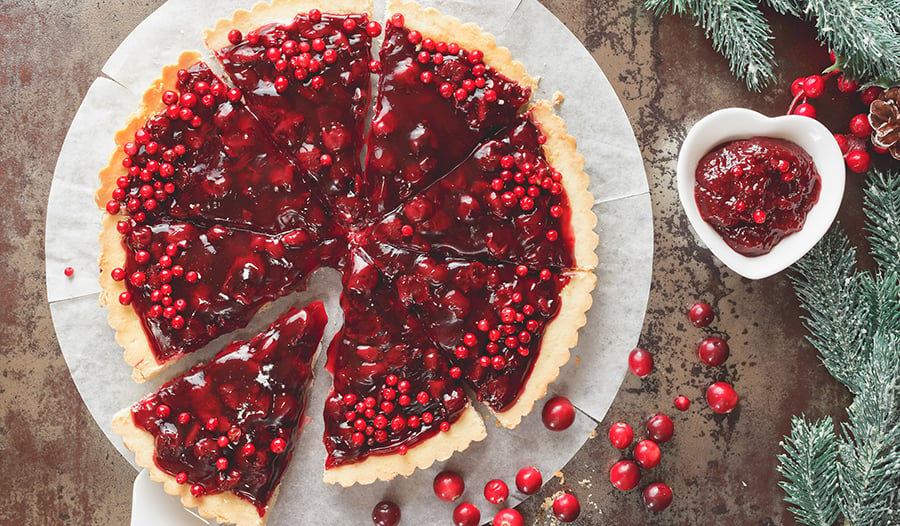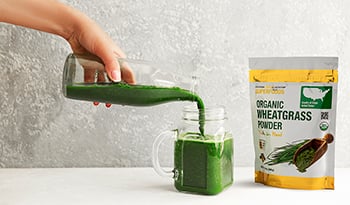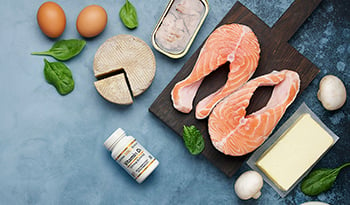Bekjemp betennelse og få bedre tarmhelse med denne supermaten

Tranebær har imponerende helsefordeler for å holde kroppen din, og spesielt tarmen, i toppform!
Tranebær er små, men mektige, og er ekte supermat som kommer i en rekke former som er enkle å konsumere: som hel, fersk frukt, tørket, juice og som tranebærpiller og -pulver. Dette syrlige og syrlige bæret har historisk sett fått oppmerksomhet for sin effekt på urinveiene, men i de senere årene har tranebær blitt studert for sine fordeler litt lenger opp i mage- og tarmsystemet, i magesekken og tykktarmen. To av de mest studerte og omtalte fordelene med tranebær er deres prebiotiske kvalitet og polyfenolnivå, som begge kan ha en positiv effekt på tarmmikrobiomet. Før vi snakker om tranebærets helsefordeler for tarmen, la oss bli litt bedre kjent med denne frukten.
Ernæringsmessige fordeler av tranebær
Tranebær er en unik matvare som representerer en av bare tre vanlig dyrkede frukter i Nord-Amerika. De er på sitt mest modne i september og desember, og er også lett å finne frosset, som tørket tranebærsnacks, som gelé på boks, syrlig usøtet tranebærjuice, tranebærjuice-cocktail, og til og med tørket i løs pulverform eller kapsler.
Ernæringsmessig gir en kopp rå, hakkede tranebær 50 kalorier, hovedsakelig fra karbohydrater, og omtrent fem gram fiber. Hvis de er tørket, tilsvarer 1⁄2 kopp av disse bærene én porsjon frukt. Denne supermaten inneholder høye nivåer av vitamin C , en kraftig antioksidant som er nyttig for å forebygge og behandle forkjølelse. , en potent antioksidant som er nyttig for å forebygge og behandle forkjølelse, samt mangan , vitamin E , vitamin C , vitamin E vitamin K og kobber .
Når du velger hvordan du skal innlemme tranebær i kostholdet ditt, bør du være oppmerksom på hvordan det er pakket. Rå tyttebær er ganske syrlige og spises sjelden alene - de bearbeides vanligvis til en saus eller drikkes som drikke. Mange av disse preparatene er tilsatt sukker for å gjøre det søtere, men det er viktig å være oppmerksom på det totale inntaket av tilsatt sukker i løpet av dagen. Et høyt og hyppig inntak av tilsatt sukker kan fremprovosere betennelser i tarmen og i hele kroppen, og det er nettopp det vi håper å redusere ved å innta denne supermaten i første omgang!
Tranebær har hatt en storhetstid i forskningsverdenen, og de studeres for sine potensielle virkninger når det gjelder å redusere betennelser i fordøyelsessystemet og ha en positiv innvirkning på mikrobiomet. La oss ta en nærmere titt på denne supermatvaren og dens rolle i tarmhelsen.
Tranebær øker tarmens gode bakterier
Hvis du er opptatt av tarmhelse, har du sannsynligvis hørt om probiotika, som er de "gode mikrobene" i tarmen vår. som er de "gode" mikrobene som lever i tarmkanalen vår og produserer gunstige forbindelser med vidtrekkende positive effekter. Det du kanskje har hørt mindre om, selv om det er minst like viktig, er prebiotika. Prebiotika er fibre som finnes i tranebær - samt andre matvarer som epler, artisjokker og purre - som passerer gjennom fordøyelsessystemet uendret og blir fermentert av de gode bakteriene i tykktarmen. De er i hovedsak maten som gir næring til gode tarmbakterier.
Tranebær inneholder en spesiell type prebiotisk fiber - et karbohydrat som kalles xyloglukan - som gode bakterier er spesielt flinke til å bruke som energikilde. Dette kan føre til produksjon av mange gunstige forbindelser som beskytter mot systemisk betennelse. Et forskerteam fra University of Massachusetts Amherst studerte nettopp denne effekten og fant ut at de ufordøyelige celleveggene i tranebær gjorde det mulig for tarmbakteriene å produsere mer bifidobakterier og maursyre, og mindre melkesyre. Du kjenner kanskje igjen bifidobakterier som en underart som finnes i fermentert mat, og som kan hjelpe mot irritabel tarm, mageinfeksjon og diaré etter antibiotika. Dette er et ganske nytt forskningsområde, men det er ikke dumt å ta med seg noen tranebærsnacks!
Fiber finnes bare naturlig i plantebaserte matvarer, så hvis du vanligvis spiser et kosthold som inneholder mye animalske produkter og bearbeidet sukker, får kroppen og tarmen din mindre av dette. En liten studie fra 2018 viste likevel at et tilskudd av tranebærpulver til frivillige som spiste et kosthold med mye mettet fett og tilsatt sukker i to uker, reduserte forekomsten av kreftfremkallende gallesyrer og økte produksjonen av antioksidanter.
En annen studie publisert i OMICS: A Journal of Integrative Biology tyder på at en porsjon søtede tørkede tranebær til lunsj i to uker er nok til å endre balansen mellom tarmbakteriene fullstendig. De fant endringer i forholdet mellom Firmicutes/Bacteroidetes (bakterier som kan gi mer betennelse kontra bakterier som produserer gunstige kortkjedede fettsyrer), økning i kommensale (vennligsinnede) bakterier og reduksjon av bakterier som er forbundet med negative helseeffekter. Resultatene krever definitivt mer forskning, men forskningen er ganske oppløftende.
Selv om det er behov for flere studier på tranebærs prebiotiske fordeler, er de antiinflammatoriske fordelene lovende! I tillegg kan det ikke skade å supplere kostholdet ved å tilsette tranebærjuice eller -pulver i en smoothie, eller friske tranebær i en søt relish eller chutney. En godbit som mellommåltid med tørkede tranebær kan også være en god måte å styrke tarmhelsen på.
Tranebær bekjemper betennelse med polyfenoler
Kanskje mer omtalt enn fiber er tranebærs høye konsentrasjon av polyfenoler, spesielt flavonoidet proanthocyanidiner (PAC). Du har kanskje hørt at blåbær er de beste når det gjelder PAC, men tyttebær inneholder faktisk høyere nivåer av A-typen av PAC. Denne underarten av proantocyanidiner har vist seg å ha kraftige antiadhesjonsegenskaper som styrker tarmcellenes forbindelser og forhindrer skade fra invaderende bakterier.
Siden tarmene våre ofte er den første forsvarslinjen mot patogener som kan forårsake infeksjoner og betennelser, ønsker vi at tarmcellene våre skal være sterke og i stand til å forsvare seg mot skadelige bakterier. Den gode nyheten er at mye nyere forskning har vist at tranebærets antioksidantegenskaper faktisk kan bidra til å beskytte magen mot slike infeksjoner. Tranebærenes PAC-er kan bidra til å forhindre at E. coli og H. Pylori, to skadelige patogener, fester seg til tarmcellene.
I en studie fra 2018 ble det observert at når konsentrasjonen av PAC-er økte, økte også de tette båndene som holder tarmcelleveggene sammen. Denne forskningen tyder på at tranebærenes PAC-er hemmer invasjonen av sykdomsfremkallende E. coli, som kan forårsake diaré, magesmerter, feber, alvorlig dehydrering og nyreskader.
Hos kvinner har en studie vist at tilsetning av tranebærjuice til en magesårbehandling med antibiotika og protonpumpehemmere fremskynder utryddelsen av H. pylori. Disse resultatene ble interessant nok ikke observert hos menn, så, damer, finn dere litt syrlig tranebærjuice og drikk opp!
Hvordan legge til flere tranebær i kostholdet ditt
Tranebærforskningen er lovende, og det finnes en rekke måter å inkludere denne supermaten i rutinen din på. Tranebærtilskuddsom ofte er laget av tranebærekstrakt eller -pulver, er en praktisk måte å høste de betennelsesdempende fordelene på, men hele matvarer kan være mer delikate og ofte like enkle å innlemme! For å få i deg mer av denne supermaten kan du prøve følgende oppskrift.
Tranebær appelsin Bliss Bites oppskrift
Ingredienser:
- 2 1/3 kopper valset havre
- 2 ss. chiafrø
- 2 ss. linfrø
- 2/3 kopp kremet mandelsmør
- 1/4 kopp honning
- 1 ts appelsinskall
- 1/2 kopp hakkede valnøtter
- 1/2 kopp tørkede tyttebær
- 3 ss. kokosnøttolje
Instruksjoner:
- Tilsett alle ingrediensene i en stor kjøkkenmaskin. Blend på høy hastighet i ca. 30 sekunder til havren er hakket godt og blandingen begynner å samle seg.
- Rull blandingen til golfballstore biter med rene hender. Denne oppskriften gir ca. 24 biter.
- Oppbevar bitene i en lufttett lukket beholder i kjøleskapet i opptil 2 uker, eller frys dem ned i en frysepose i opptil 2 måneder.
Referanser:
- "Tranebærinstituttet." Tranebærinstituttet, cranberryinstitute.org/. Besøkt 28. september 2019.
- "MyPlate Partner Title Bli en MyPlate-partner!" ChooseMyPlate, www.choosemyplate.gov/. Besøkt 28. september 2019.
- Özcan, Ezgi, et al. "En menneskelig tarmkommensal fermenterer karbohydrater fra tranebær for å produsere formiat." Applied and Environmental Microbiology, vol. 83, nr. 17, 2017, doi:101128/aem.01097-17.
- Rodríguez-Morató, Jose, et al. "Tranebær demper endringer i mikrobiotaens sammensetning og funksjonalitet som følge av dyrebasert kosthold: et randomisert, crossover-kontrollert fôringsforsøk." The Journal of Nutritional Biochemistry, bind 62, 2018, s. 76-86., doi:10.1016/j.jnutbio.2018.08.019.
- Bekiares, Nell, et al. "Effekten av inntak av søtede tørkede tranebær på urinproteomet og mikrobiomet i avføringen hos friske mennesker." OMICS: A Journal of Integrative Biology, bind 22, nr. 2, 2018, s. 145-153., doi:10.1089/omi.2016.0167.
- Alfaro-Viquez, Emilia, et al. "Tranebærproantocyanidin-kitosan-hybridnanopartikler som en potensiell hemmer av ekstraintestinal patogen Escherichia coli-invasjon av tarmepitelceller." International Journal of Biological Macromolecules, vol. 111, 2018, s. 415-420., doi:10.1016/j.ijbiomac.2018.01.033.
- Nicolescu, Florica. "Spesielle forhold ved Helicobacter pylori-infeksjon hos barn." Trends in Helicobacter Pylori Infection, 2014, doi:10.5772/58326.
- Shmuely, Haim, et al. "Effekten av tranebærjuice på utryddelsen av Helicobacter pylori hos pasienter som behandles med antibiotika og en protonpumpehemmer." Molecular Nutrition & Food Research, vol. 51, nr. 6, 2007, s. 746-751., doi:10.1002/mnfr.200600281.
ANSVARSFRASKRIVELSE:Velværesenteret har ikke til hensikt å gi diagnoser ...
















































































 Innholdsfortegnelse
Innholdsfortegnelse















